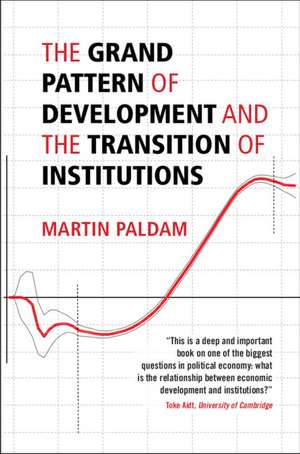The Grand Pattern of Development and the Transition of Institutions
Autor Martin Paldamen Limba Engleză Hardback – 18 aug 2021
Preț: 274.80 lei
Nou
Puncte Express: 412
Preț estimativ în valută:
52.59€ • 54.49$ • 43.89£
52.59€ • 54.49$ • 43.89£
Carte disponibilă
Livrare economică 28 februarie-14 martie
Livrare express 13-19 februarie pentru 36.49 lei
Preluare comenzi: 021 569.72.76
Specificații
ISBN-13: 9781316515501
ISBN-10: 1316515508
Pagini: 286
Dimensiuni: 158 x 235 x 19 mm
Greutate: 0.55 kg
Editura: Cambridge University Press
Colecția Cambridge University Press
Locul publicării:New York, United States
ISBN-10: 1316515508
Pagini: 286
Dimensiuni: 158 x 235 x 19 mm
Greutate: 0.55 kg
Editura: Cambridge University Press
Colecția Cambridge University Press
Locul publicării:New York, United States
Cuprins
Foreword; Part I. Main Ideas: 1. Introduction; 2. Some technical points; 3. The largest historical event: the end of Soviet socialism; Part II. The Transitions of Institutions: Part IIA. The Democratic Transition: 4. Literature, data, transition path and causality; 5. The jumps model for the short run, 1960–2016; 6. Events are practically random; 7. Three pillars model for the long run, 1800–2016; Part IIB. The Transition of the Economic System: 8. Ownership preferences: the B-index; 9. Economic freedom: the F-index; Part IIC. The Transitions in Traditions and Beliefs: 10. The transition of corruption; 11. The religious transition; Part III. The Grand Transition: 12. The hump-shaped transition path for the growth rate; 13. Do improvements of institutions harm development?; 14. Conclusions.
Recenzii
'Martin Paldam has for a long time made major contributions to help us understand the relationship between economic growth and political institutions. His uses a large number of data skillfully and in an extraordinary way; his focus always is on the questions and issues involved. It is most welcome that his immense knowledge is now presented in this book.' Bruno S. Frey, University of Basel
'This is a 'big think' book, examining the interrelationship of social, political and economic variables in countries' transition from low to high incomes. Paldam painstakingly identifies the best available data and with appropriate qualifications and concludes that the level of income was the major driver of these variables. This is an important contribution to our understanding of the relationship between key variables in the development process.' Anne O. Krueger, John Hopkins University
'This is a deep and important book on one of the biggest questions in political economy: what is the relationship between economic development and institutions? Paldam's central thesis is that economic development causes democratization and eliminates corruption in the long run. His arguments are persuasive, the result of years of thoughtful scholarship. The book is a must read for anyone who wants to understand the connection between development and institutions.' Toke Aidt, University of Cambridge
'Martin Paldam investigates the grand pattern of development. No small puzzles for him. His answers are most sensible, and they can differ from the pronouncements heralded from the towers of privileged domains. He does not equivocate to avoid what some people prefer he not say. He is a careful thinker and cautious empiricist who weighs his conclusions carefully. In this book he addresses the societal transitions that are so important for economic development.' Arye Hillman, Bar-Ilan University
'This is a 'big think' book, examining the interrelationship of social, political and economic variables in countries' transition from low to high incomes. Paldam painstakingly identifies the best available data and with appropriate qualifications and concludes that the level of income was the major driver of these variables. This is an important contribution to our understanding of the relationship between key variables in the development process.' Anne O. Krueger, John Hopkins University
'This is a deep and important book on one of the biggest questions in political economy: what is the relationship between economic development and institutions? Paldam's central thesis is that economic development causes democratization and eliminates corruption in the long run. His arguments are persuasive, the result of years of thoughtful scholarship. The book is a must read for anyone who wants to understand the connection between development and institutions.' Toke Aidt, University of Cambridge
'Martin Paldam investigates the grand pattern of development. No small puzzles for him. His answers are most sensible, and they can differ from the pronouncements heralded from the towers of privileged domains. He does not equivocate to avoid what some people prefer he not say. He is a careful thinker and cautious empiricist who weighs his conclusions carefully. In this book he addresses the societal transitions that are so important for economic development.' Arye Hillman, Bar-Ilan University
Notă biografică
Descriere
Challenges traditional views on development to show the direction of causality is from income to institutions.
